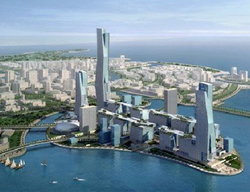James Vincent* says Saudi Arabia’s plans for a new megacity are a mixture of dystopian fiction and childish imaginings.
 The riches of Silicon Valley have enabled some extravagant and quixotic projects, but they’ve got nothing on what oil money can do.
The riches of Silicon Valley have enabled some extravagant and quixotic projects, but they’ve got nothing on what oil money can do.
A new report from The Wall Street Journal shares some of the proposals for Saudi Arabia’s biggest megaproject yet: a city built in the desert named Neom, where robots will outnumber humans and hologram teachers will educate genetically enhanced students.
The details are stunning.
It’s a mixture of dystopian fiction (AI surveillance cameras everywhere!) and childish imaginings (let’s build a robot dinosaur park!).
Taken together, the plans remind of you what a dedicated nine-year-old can achieve in Minecraft.
Yes, the scale and ambition are impressive, but it’s not like you could do this in real life, right?
Cloud seeding? Robot servants? A fake moon!? Sure, why not
These are only proposals, of course, dreamt up by American consulting firms like McKinsey and Boston Consulting who have no incentive to bring Saudi leaders down to Earth.
But all the same, they give you a flavour of what trillions of dollars of oil wealth will do to your sense of proportion.
Here are some highlights from The Wall Street Journal report:
- Cloud seeding: The planned site for Neom sits on the coast and is surrounded by desert. In order to create a temperate climate, cloud seeding could be used to make it rain.
- Dystopian surveillance: In the city of the future, cameras, drones, and facial recognition will be ubiquitous. The aim is only to keep citizens safe, of course!
- Genetic engineering: Neom would host a genetic-modification project of some sorts. The Wall Street Journal quotes plans from Japanese tech giant Softbank to create “a new way of life from birth to death reaching genetic mutations to increase human strength and IQ”.
- Robots everywhere: Robot “maids” would do your chores for you; robot cage fights would be staged for your amusement; and an amusement park full of robot dinosaurs would make for a fun day out at the weekend.
- Flying taxis: “I don’t want any roads or pavements. We are going to have flying cars in 2030!” said Prince Fahd bin Sultan, the region’s Governor, in a planning meeting. Another planning document reportedly read: “Driving is just for fun, no longer for transportation.”
- Fake moon: Details are unclear in what is already an incredibly hazy report, but apparently there have been proposals for a fake moon, which could perhaps be created by a fleet of drones or involve live-streaming images from space. Sure!
The whole Neom project is undeniably fascinating.
It was first announced in 2017, with Saudi Arabia’s de-facto leader, Crown Prince Mohammed bin Salman, saying he wants the city to attract the “world’s greatest minds and best talents”.
According to planning documents reported by The Wall Street Journal, bin Salman “envisions Neom [as] the largest city globally by GDP [gross domestic product], and wanted to understand what he can get with up to US$500 billion [A$724 billion] investment.”
The project is the flagship of Saudi Arabia’s plans to diversify the country’s economy away from oil.
Saudi leaders know this source of revenue can’t last forever, and they’re keen to develop cities like Neom as new commercial hubs.
(Similarly ambitious projects, like the King Abdullah Economic City, have already failed.)
As currently planned, Neom will occupy a region about twice the size of Melbourne.
This will include a huge coastal urban sprawl; outlying towns and villages; advance manufacturing hubs in industries like biotech and robotics; and links with international shipping routes.
Early building work has already begun, with facilities including a new airport and palace.
Whether Neom will live up to its planners’ dreams, though, is anyone’s guess.
A lot of factors have stopped Saudi Arabia attracting international business thus far, notes The Wall Street Journal, including corruption, a difficult legal system, and social norms that range from unappealing to straightforwardly immoral for Western visitors.
Alcohol is banned; women’s rights are restricted; and homosexuality is illegal.
(The The Wall Street Journal reports that some of these strictures might be relaxed for Neom.)
That’s not to mention the sweltering weather, which climate change will certainly exacerbate, creating extreme heatwaves and flooding.
The whole enterprise may depress or excite you, but you can’t deny it’s emblematic of the modern world: a country in the desert desperately trying to turn oil riches into a technological haven before it’s too late.
The question at stake seems nothing less than: can we buy a new future?
Is it possible to save ourselves?
* James Vincent is a senior reporter for The Verge. He tweets at @jjvincent.
This article first appeared at www.theverge.com.


